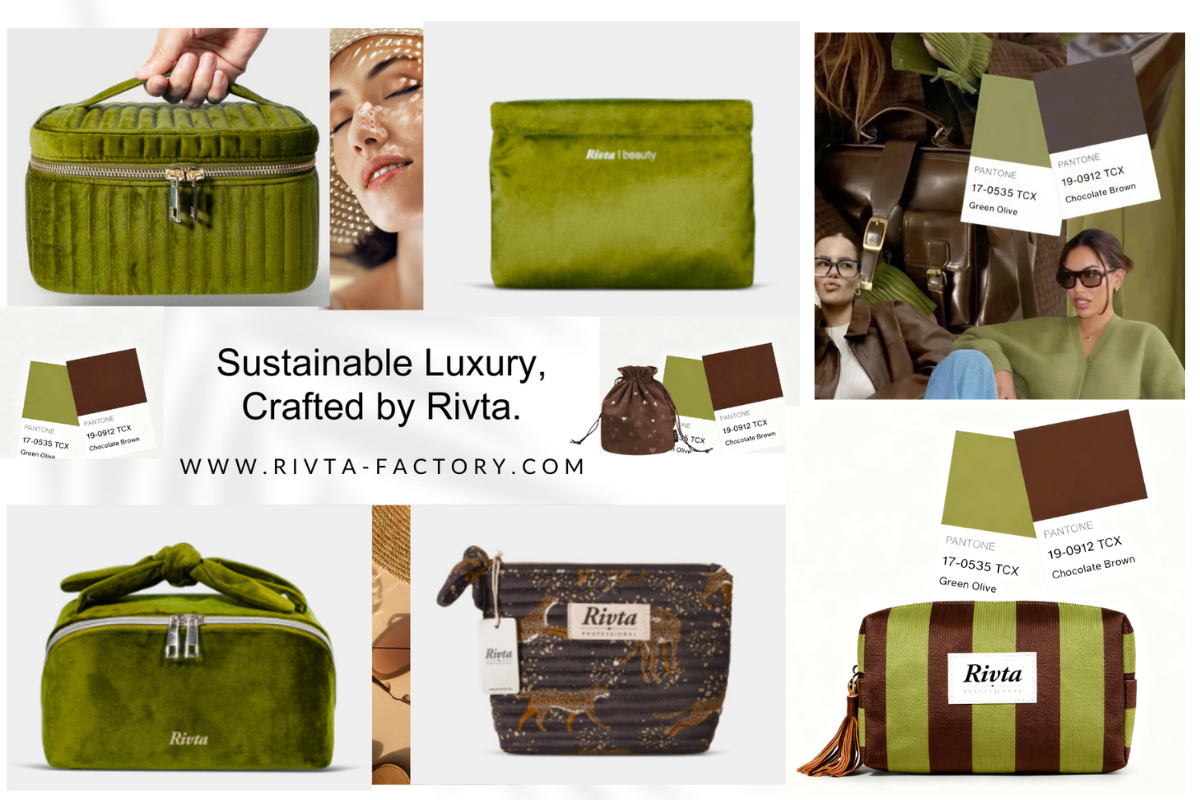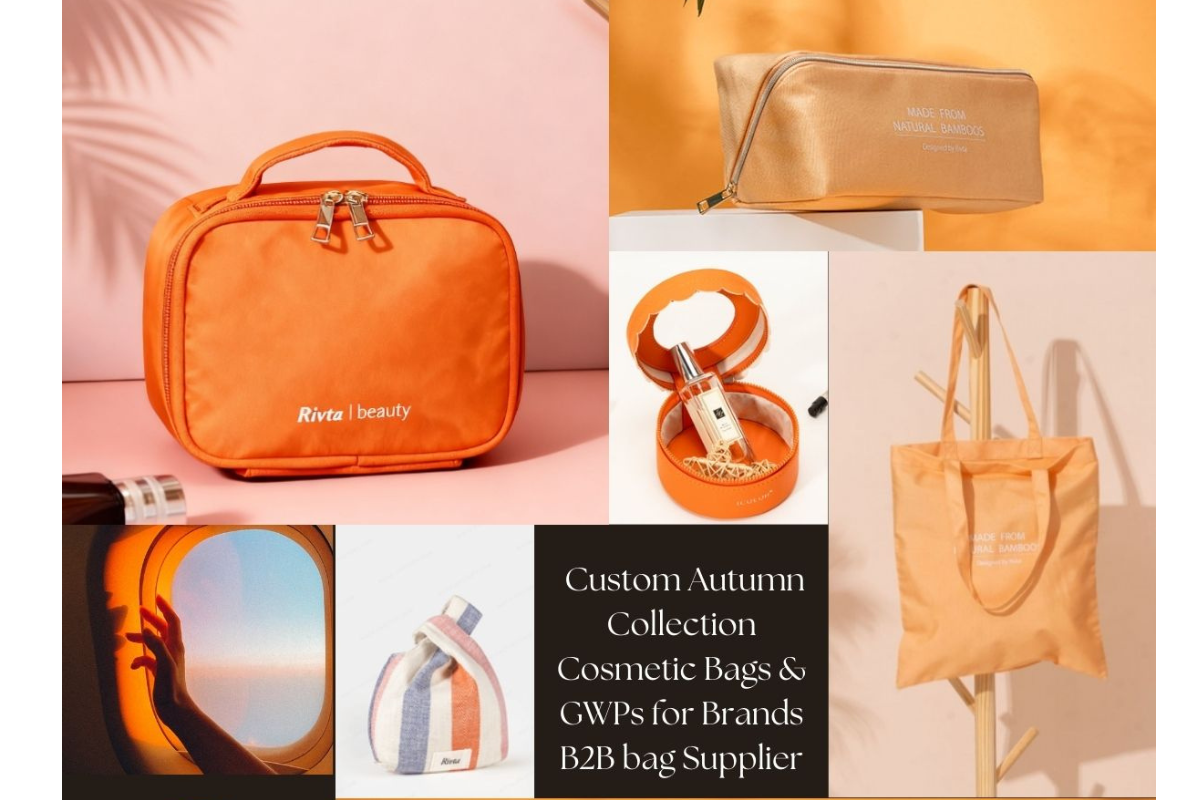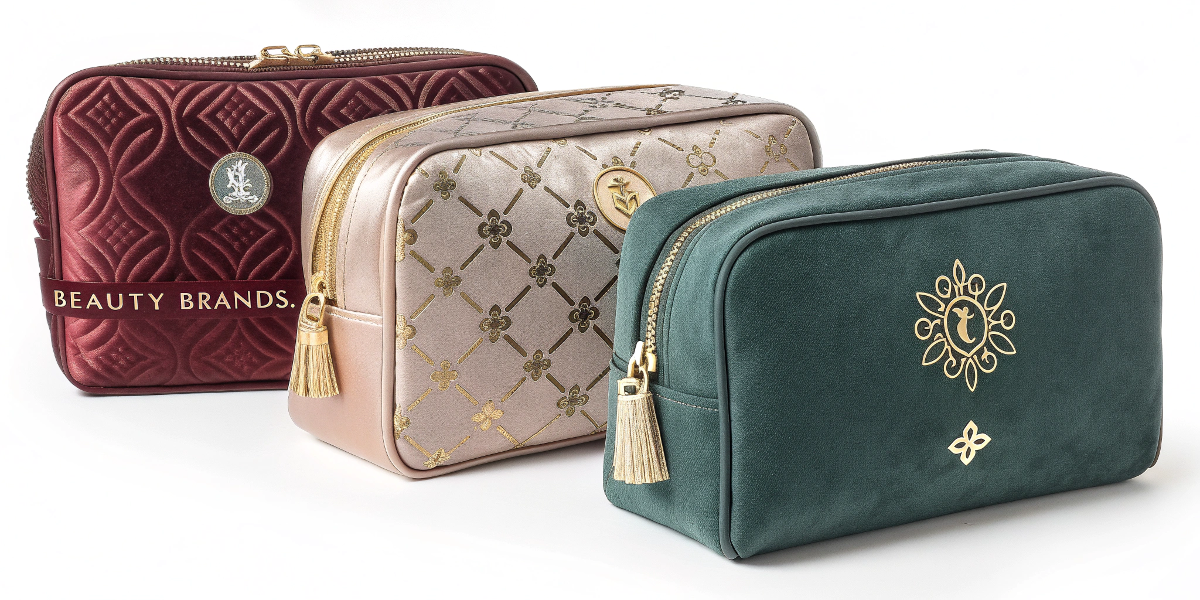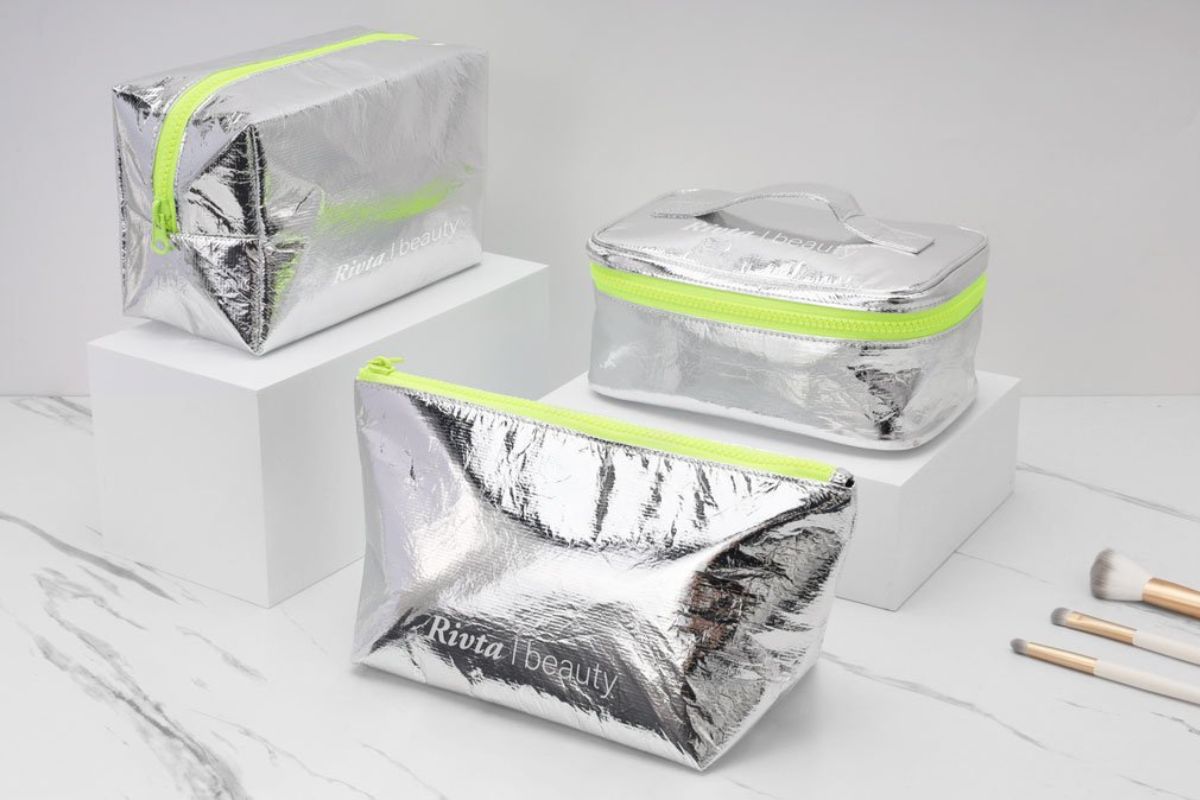From Idea to Reality: The Journey of a Private Label Makeup Bag?
You have a vision for a unique line of cosmetic bags, but the path from sketch to shelf seems impossibly complex. This uncertainty can stop a great idea in its tracks.
A private label makeup bag journey involves co-designing with a manufacturer, sourcing specific materials, creating and approving prototypes, and then moving to mass production. This includes cutting, logo application, sewing, rigorous quality control, and final packaging tailored to your brand.
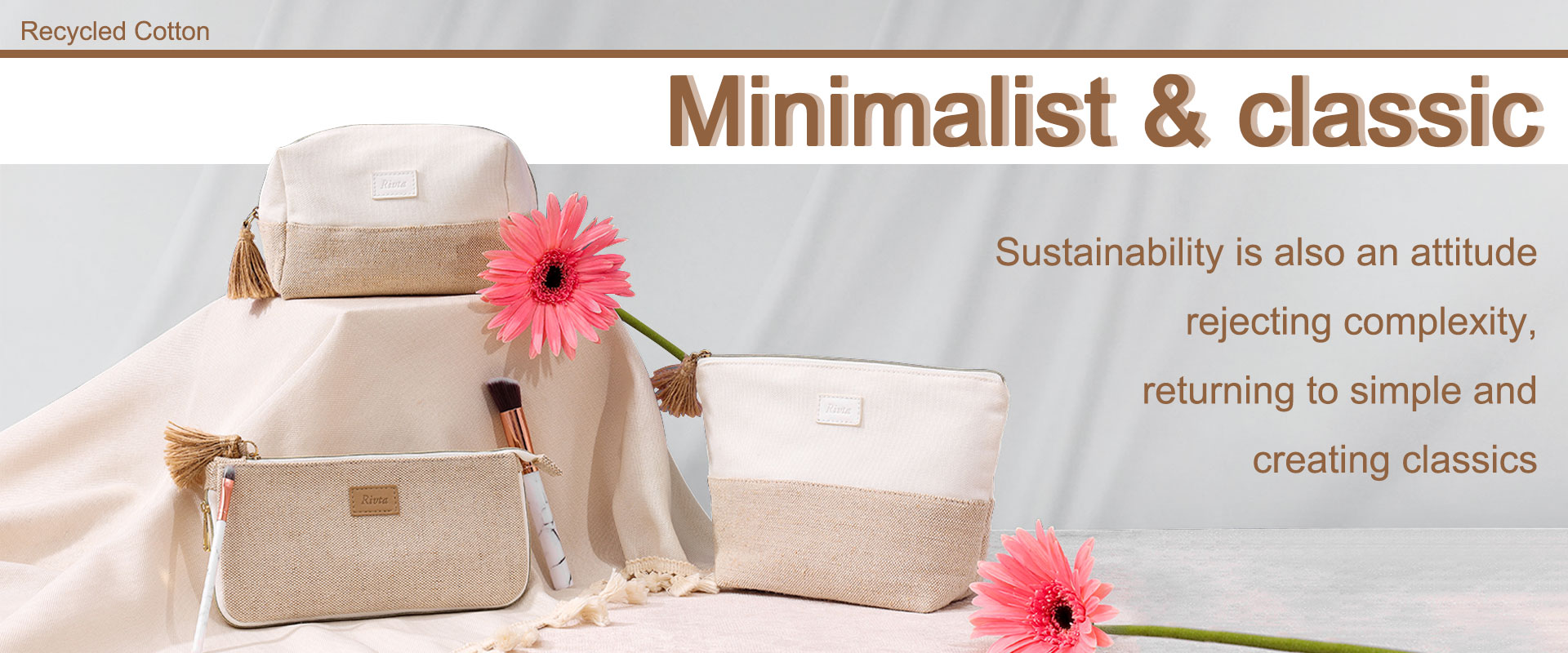
I've been running a factory that partners with brands since 1990, and I’ve seen it all. The most successful projects happen when brand designers, like Jennie, understand the production journey. It's not about knowing how to sew; it's about knowing the key stages and decision points. This knowledge empowers you to ask the right questions and collaborate effectively with a manufacturer to bring your vision for a branded cosmetic pouch to life. Let’s walk through the exact process we use to turn a design concept into a finished product ready for your customers.
What are the key stages in private label cosmetic bag production?
You've approved a design, but what happens next on the factory floor? It can feel like a black box, leaving you wondering about your project's progress and quality control.
The main production path for a private label cosmetic bag is clear. It starts with pre-production setup, moves to mass production which includes fabric cutting, logo printing, and sewing, and ends with a final quality inspection before packing. This ensures every bag meets your brand's standards.
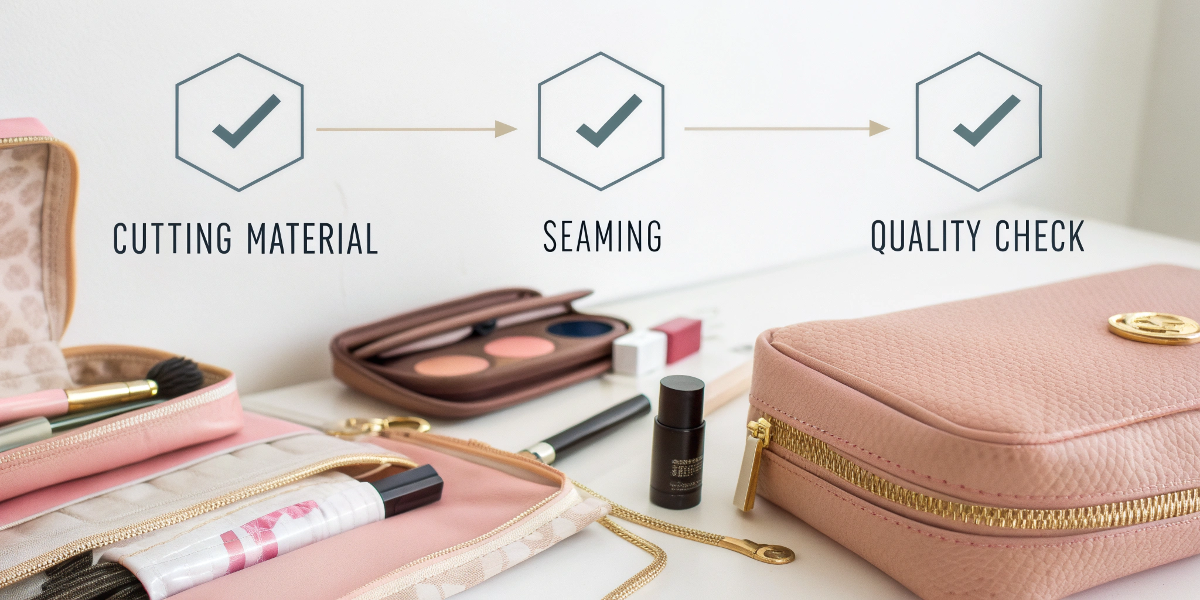
This process is a structured system, not a chaotic rush. Every department in my factory, from material sourcing to the final packing line, has a specific role. For a designer like Jennie, who works with luxury brands on tight schedules, this predictability is everything. It allows her to confidently plan marketing campaigns and retail launches, knowing that each stage of production is handled by skilled experts. This systematic approach is what turns a simple order into a successful private label partnership. Let's look closer at what each phase involves.
A Step-by-Step Look at Production
The creation of your custom cosmetic bag follows a logical flow. We break it down into three distinct phases to ensure quality and efficiency at every turn. This methodical approach is crucial for any private label product that carries your brand's name.
| Stage | Key Activities | Why It's Crucial for Private Label |
|---|---|---|
| 1. Pre-Production | We create cutting molds, source and test all brand-specific materials, and produce a final pre-production sample (PPS) for your approval. | This is the most important step. Your approval on the PPS locks in the quality standard for the entire production run. |
| 2. Mass Production | We cut all fabric panels, apply your logo via printing or embroidery, and the sewing teams assemble the bags. | This is where skilled labor and efficient processes create your product at scale. Consistency here is key to your brand's reputation. |
| 3. Post-Production | We conduct a final quality inspection based on AQL standards, trim loose threads, clean each item, and pack the bags to your specifications. | This final check protects your brand from defects and ensures a perfect unboxing experience for your customer. |
This isn't just about making a bag; it's about building your brand. Unlike generic manufacturing, the private label process has built-in checkpoints, like sample approvals, that give you complete control. For example, when making custom logo makeup bags, the placement and quality of the logo are checked multiple times before the final sewing even begins. This attention to detail is what defines a successful private label relationship.
Which materials work best for a custom makeup bag line?
Choosing the right material for your private label line is a difficult decision. The wrong fabric can cheapen your brand's image or fail to connect with your target customers' values.
Makeup bags are made from many materials. Natural fabrics like cotton canvas offer a premium feel. Durable synthetics like nylon and polyester provide practicality. Trendy, eco-friendly options like recycled PET (RPET) and vegan leather reflect modern consumer demands for sustainability.
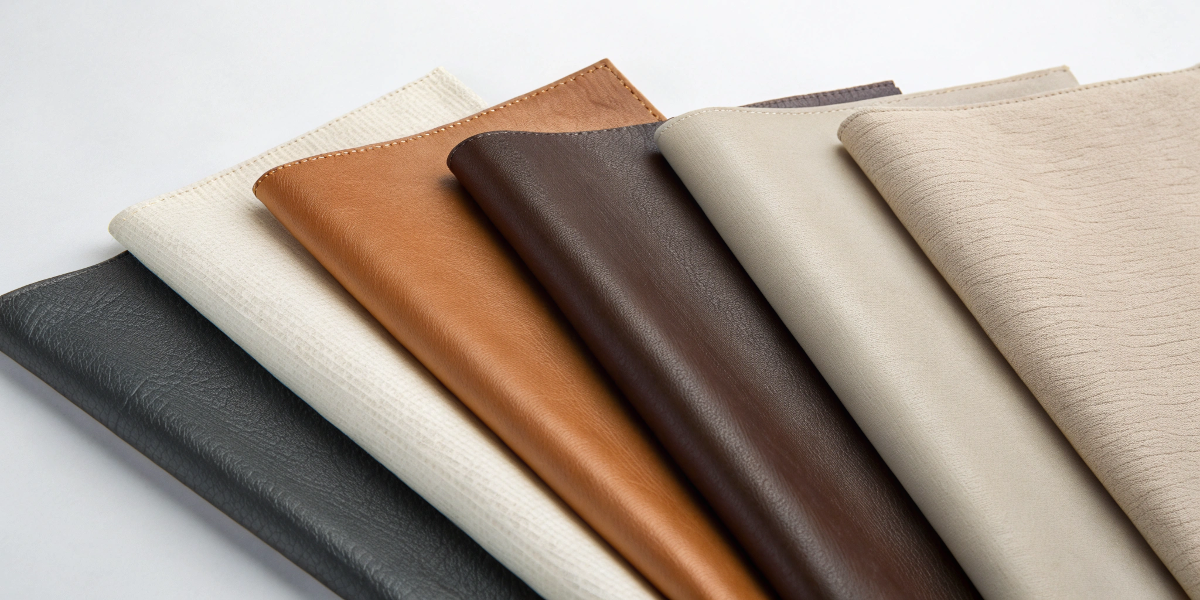
The material you select for your cosmetic bag is a direct message about your brand. I remember when basic polyester was the default choice for almost every client. Now, when I work with designers like Jennie, the conversation starts with sustainability. They want to know about our GRS-certified recycled materials or our high-quality vegan leathers. This shift is driven by consumers who want to buy from brands that share their values. As a manufacturer specializing in private label, our job is to source and provide these materials, helping you build a product that is not only beautiful but also responsible.
Matching Materials to Your Brand Identity
The right fabric impacts a bag's function, feel, price, and brand story. Understanding these options helps you create a product that resonates with your ideal customer. For any brand creating a makeup bag private label line, this choice is fundamental.
| Material Type | Examples | Best For Brands That Are... | Why It Works |
|---|---|---|---|
| Natural | Cotton Canvas, Jute | Organic, minimalist, and focused on natural ingredients. | These materials have a raw, authentic feel and are biodegradable, aligning with an earthy brand ethos. |
| Synthetic | Nylon, Polyester, PVC | Practical, performance-focused, or targeting a lower price point. | They are highly durable, water-resistant, and easy to clean, making for a functional and long-lasting cosmetic bag. |
| Eco-Friendly | RPET, Vegan Leather, TPU | Modern, sustainable, and targeting conscious consumers. | Meets the growing demand for ethical and environmentally friendly products, enhancing brand reputation. |
Think about your customer. Is she buying a luxury skincare set? A high-grade vegan leather branded cosmetic pouch would be a perfect fit. Is she a college student looking for a fun, durable makeup bag? A colorful design made from recycled PET would be an instant hit. As a vanity case manufacturer, we source a wide range of certified materials to ensure your product's story starts with the right fabric.
How do you give a private label vanity case its shape?
You want your cosmetic bag to have a distinct, premium shape, not just be a simple pouch. How do factories build that structure so it protects what's inside and looks high-end?
To structure a bag, we insert materials between the outer fabric and inner lining. For a rigid shape like a vanity case, we use stiff PE boards. For semi-structured cases that need to be protective yet flexible, we use dense EVA foam.
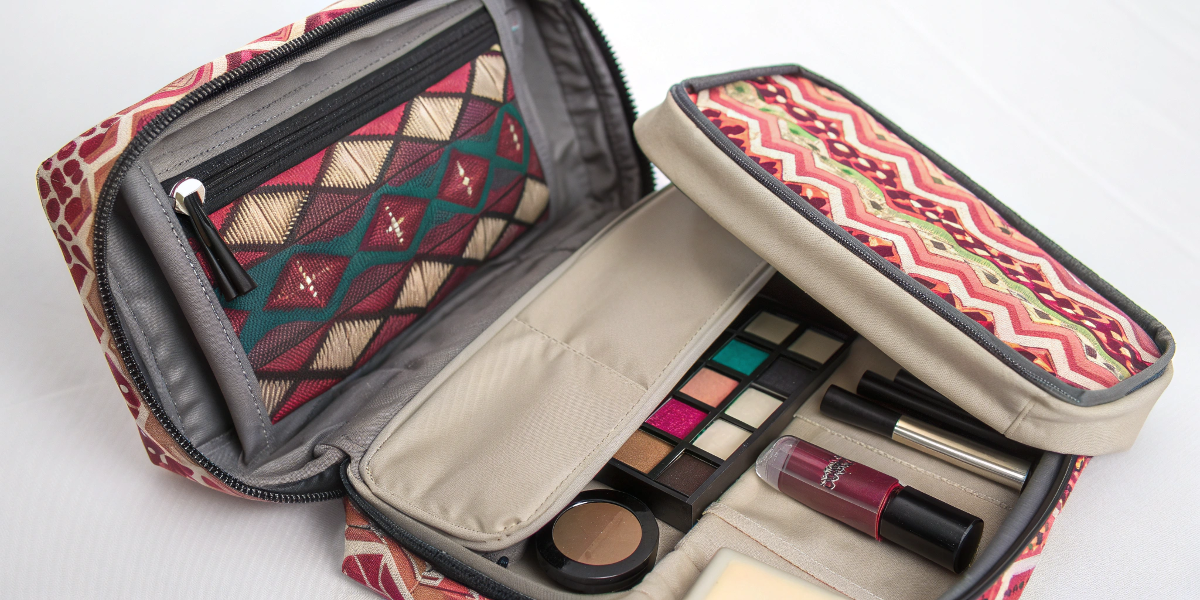
Structure is the invisible element that separates a cheap pouch from a luxury cosmetic case. It's a detail that customers can feel instantly. When we develop a new design for a private label client, we always discuss the intended use. A professional makeup artist needs a rock-solid vanity case to protect hundreds of dollars worth of products, so we use rigid PE boards. But for a soft travel pouch, a thin layer of foam is enough to give it a nice body and a padded feel. This decision directly impacts the user's experience with your brand.
The Unseen Details That Define Quality
The internal material, called "interlining," is the secret to a bag's form and function. The choice here depends entirely on the design goals for your private label cosmetic bag. This element is as important as the outer fabric.
| Interlining Material | Best For | Key Characteristic | Impact on Your Brand |
|---|---|---|---|
| PE Board | Rigid, boxy shapes like train cases and vanity cases. | A hard, stiff plastic sheet that creates sharp, defined edges. | Conveys a professional, high-end, and protective quality. |
| Foam/Sponge | Padded pouches and bags that need to protect delicate items like palettes. | Soft, lightweight, and adds a plush, cushioned feel. | Gives a sense of care and luxury, assuring customers their items are safe. |
| EVA Foam | Semi-rigid cases like essential oil bags or electronics organizers. | A dense yet flexible foam that holds its shape and absorbs impact. | Communicates durability and thoughtful design for specific, functional purposes. |
When you're developing your custom logo makeup bags, always talk to your manufacturer about the desired "hand feel" and structure. We can send samples with different interlinings so you can feel the difference yourself. This small detail has a huge impact on how customers perceive the quality and value of your product. Getting it right is a key part of building a successful private label brand.
What should you look for in a private label cosmetic bag manufacturer?
Choosing a factory to produce your branded cosmetic bags is a critical business decision. The wrong partner can lead to quality disasters, missed deadlines, and damage to your brand's reputation.
You need a manufacturing partner, not just a supplier. Look for a private label cosmetic bag manufacturer with an organized factory, a dedicated quality control process, and clear communication. Their experience in creating custom products for brands like yours is absolutely essential.
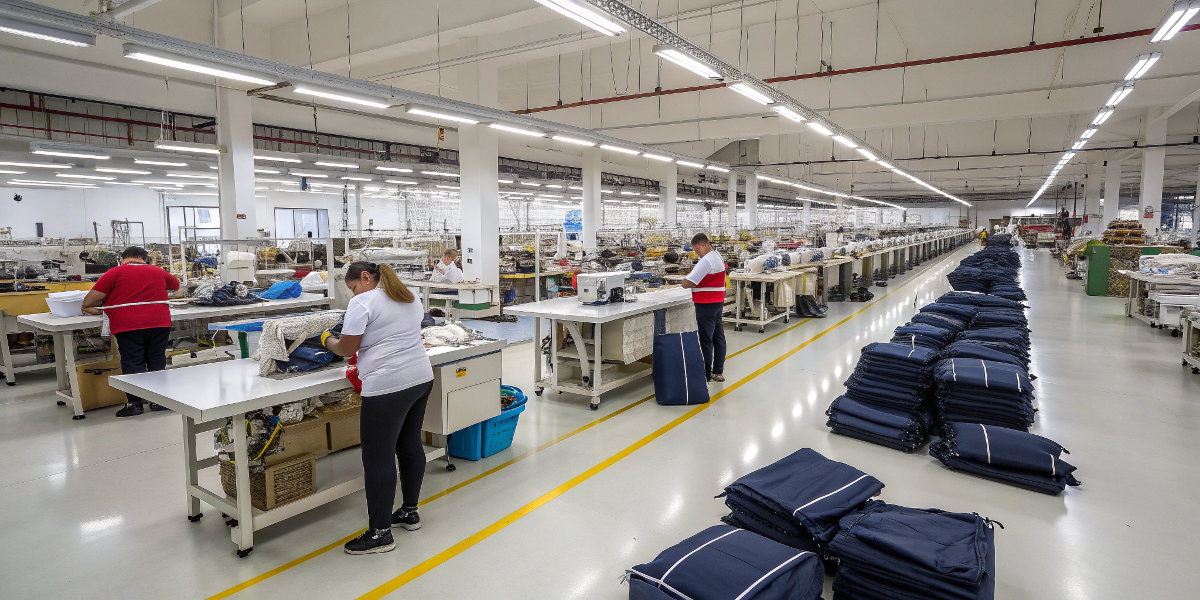
I’ve built my business on being a true partner to brands. A designer like Jennie doesn't just send us a tech pack and hope for the best. We have detailed discussions about materials, we collaborate on solving design challenges, and we provide complete transparency throughout the production process. A good manufacturer doesn't just take orders; they provide expertise and guidance. They understand that their success is tied directly to the success of your product in the market. That is the difference between a simple supplier and a long-term manufacturing partner.
Choosing Your Manufacturing Partner
A factory is more than just a building with sewing machines. For a private label brand, your manufacturer is an extension of your team. Here are the key things to evaluate to ensure you find a reliable partner.
- Specialization and Expertise: Do they have deep experience making cosmetic bags and vanity cases? A factory that specializes in this category will understand the specific needs related to materials, zippers, and interior layouts. They can offer valuable suggestions to improve your design for better function and cost-effective production.
- Robust Quality Control (QC): Ask about their QC process. A professional factory will perform inspections at multiple stages: when raw materials arrive, during the sewing process (inline inspection), and before the products are packed (final inspection). They should be familiar with standards like AQL (Acceptable Quality Limit) to ensure consistency across thousands of units.
- Clear Communication: Your partner must be easy to communicate with. They should provide a dedicated project manager who gives you regular updates. A lack of communication is a major red flag and often leads to misunderstandings and production errors.
- Social and Environmental Responsibility: Look for certifications like ISO 9001 (for quality management) or GRS (Global Recycled Standard). These show that the factory is committed to professional standards and ethical practices, which protects and even enhances your brand's reputation.
Ultimately, you are trusting your manufacturer with your brand's physical product. Choose a partner who is as invested in quality as you are.
Conclusion
Understanding the private label journey turns a complex process into a manageable partnership. It empowers you to work with your manufacturer to create a cosmetic bag that perfectly represents your brand.
